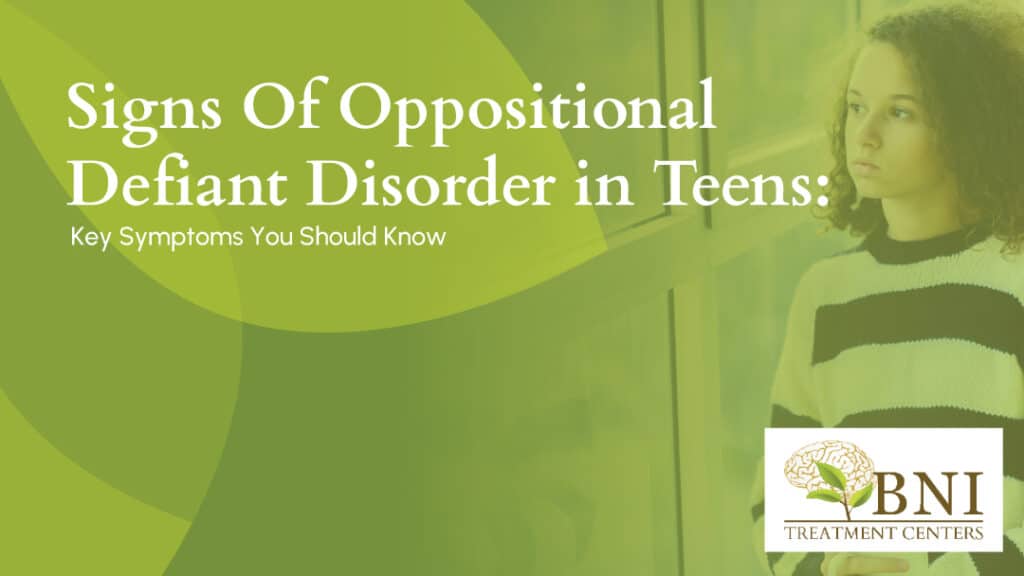
When adolescents exhibit defiant behaviors, like “talking back” or refusing to follow instructions, it can be a frustrating and difficult experience for parents. While occasional defiance is a typical aspect of adolescent development, persistent and extreme oppositional behavior may indicate a more serious underlying issue. How should parents respond when their child consistently faces school suspensions or consistently disregards established rules despite clear consequences?
Such behaviors may be indicative of oppositional defiant disorder (ODD) or other behavioral health concerns, warranting professional evaluation and intervention. In 2021, 9.3% of children between the ages of 3 and 17 in California received mental health care. However, a significant number of children across the United States continue to lack access to the necessary treatment and support.
At BNI Treatment Centers, we recognize the complexities of adolescent mental health and the concerns that parents face in addressing these challenges. Let’s talk about oppositional defiant disorder, including its defining characteristics, associated risk factors, and evidence-based treatment approaches to help adolescents and their families navigate this condition effectively.
Definition and Overview of Oppositional Defiant Disorder (ODD)
Oppositional defiant disorder (ODD) is a psychological condition characterized by persistent patterns of defiant, hostile, and uncooperative behavior toward authority figures that significantly impair social, academic, and family functioning. Unlike typical childhood disobedience, ODD symptoms are more intense and last for at least six months, affecting multiple areas of life.
ODD typically presents in early childhood, though its effects become increasingly pronounced during adolescence. The disorder is marked by recurrent temper outbursts, argumentativeness, vindictiveness, and an unwillingness to comply with rules or requests.
Oppositional Defiant Disorder in Adolescents: Characteristics and Implications
Adolescents with ODD display a range of behavioral, emotional, and cognitive difficulties that cause significant disruptions to their developmental trajectory. Core characteristics have been summarized as irritability, headstrong, and hurtful behaviors. ODD in adolescents has been connected with young adult depression and anxiety, as well as conduct disorder. Research has shown those who experience more irritable symptoms are more likely to develop a mood disorder. Those who experience headstrong and hurtful behaviors increase the risk of ODD progressing into conduct disorder.
Etiology and Contributing Factors of Oppositional Defiant Disorder
The development of ODD is not caused by a singular factor but by a combination of genetic and environmental factors. Adolescents with a family history of mood disorders, ADHD, or other behavioral disorders are at an increased risk of developing ODD. Predispositions to poor stress or frustration management contribute to differences in temperament and emotional regulation, which make certain adolescents more susceptible to defiant behavior.
Environmental factors also play a crucial role in the development of ODD. Adolescents raised in environments with inconsistent discipline, exposure to parental conflict, or experiences of neglect and abuse are more likely to develop oppositional behaviors. Parenting styles characterized by harsh punishment or excessive permissiveness reinforce defiance and oppositional attitudes, especially starting at a young age.
Identifying Symptoms and Behavioral Patterns of ODD in Adolescents
Early identification of ODD is critical in preventing the disorder from worsening and leading to more severe behavioral concerns. Early signs are noticeable through several key symptoms, which must be present for an ODD diagnosis. Behavioral and emotional symptoms commonly observed in adolescents with ODD include:
- Persistent irritability and anger
- Argumentative behavior with authoritative figures such as parents and teachers
- Refusal to comply with rules or directives
- Deliberate attempts to annoy or provoke others
- Vindictiveness or a tendency to seek revenge
- Placing blame or responsibility for misbehavior on others
These symptoms must occur consistently over at least six months and cause significant impairment in social, academic, or occupational functioning. With ODD, symptoms can appear early, such as during the elementary years, however, signs may be subtle or pass as normal childhood behavior in adolescence.
Strategies for Managing and Supporting Adolescents with Oppositional Defiant Disorder
Effective management of ODD requires a multifaceted approach involving behavioral interventions, family support, and, in some cases, medication. One of the primary treatment modalities for ODD is cognitive behavioral therapy (CBT), which helps adolescents develop coping skills, improve emotional regulation, and adopt more adaptive behavioral responses.
Parent management training (PMT) is an effective intervention that equips parents with strategies to reinforce positive behaviors and establish consistent discipline. Parents can reduce conflict and improve their child’s behavioral outcomes by creating a structured and supportive home environment. Teachers and school personnel can also implement behavioral interventions in academic settings to help adolescents with ODD improve their social interactions, problem-solving skills, and compliance with rules.
Getting ODD Treatment for Teens in Agoura Hills, CA
As parents, it is normal to want the best for your teen, and hearing a diagnosis of oppositional defiant disorder can leave you with concerns. Through therapeutic interventions for yourself and your teen, ODD can be managed with social skill building. Teen ODD treatment will involve sessions to regulate emotions and behaviors in a stable and safe environment. In some cases, medications may be utilized to help manage severe symptoms and promote positive healing. Parents will receive support and therapy that will solidify a quality care plan moving forward.
If your teen is showing signs of ODD, help is available today. BNI Treatment Centers is a psychiatrist-led facility where each of our experts has a role in your teen’s care. Our goal is to focus on your teen and your family’s individual needs, ensuring an all-encompassing path to mental wellness. Call us today at (888) 522-1504 to learn more about our program offerings.
BNI Treatment Centers: Science-based, evidence-backed, compassion-led.




